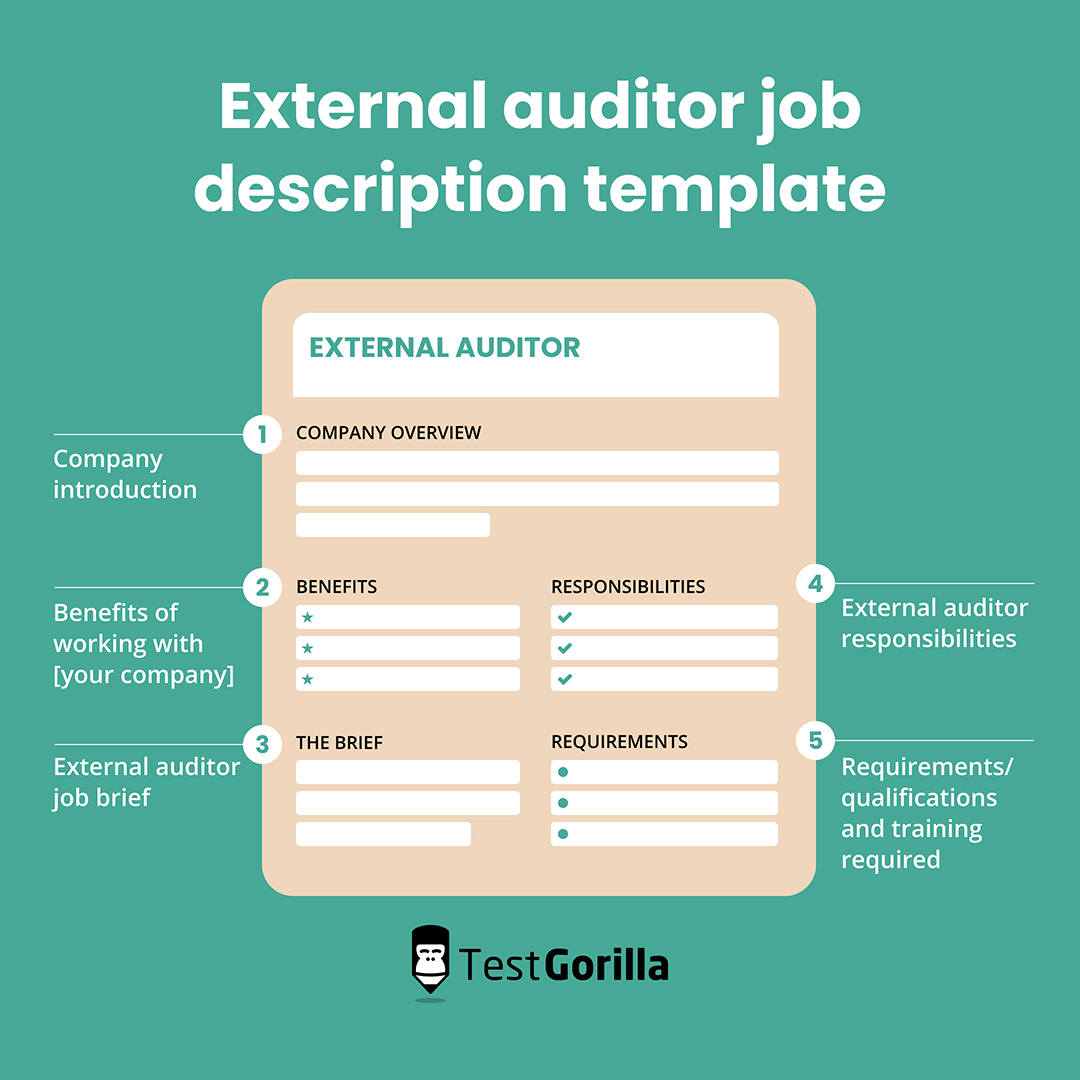A good external auditor is not only adept in technical accounting. They must also excel in communication and client relations, operate independently and objectively, and be intuitive investigators.
Businesses rely on financial auditors to identify critical errors, find evidence of fraud, and guide them in their decision-making. As a result, companies extend a high level of trust to external auditors. There’s no room for error when finding the right auditor to join your ranks.
This article explains how to craft a compelling job description to help you find and attract qualified external auditors. Use our ready-made template and helpful resources to ensure applicants meet your requirements.
Table of contents
- What is an external auditor?
- Key skills to look for in external auditors
- How to write an effective external auditor job description
- External auditor job description template
- Two things to avoid when writing a job description for external auditors
- Next steps: Attracting and assessing external auditor candidates
- FAQs
- Find top external auditors with TestGorilla
What is an external auditor?
An external auditor independently assesses the financial records of a company or organization. Their duties include the following:
Planning and carrying out audit procedures and tests, including custom audits, where needed.
Reviewing documentation, including financial records and accounts, for compliance and accuracy.
Interviewing staff, visiting on-site business locations, and attending meetings to gather information for audits.
Assisting organizations with risk management.
Creating, contributing to, and presenting audit reports and findings, including recommendations.
External auditors aren’t directly employed by the organization they’re auditing and usually work for a specialist auditing agency or firm.
Key skills to look for in external auditors
Financial and math skills are essential for auditors to analyze financial information using statistical analysis and calculus.
However, you’ll also want professionals who possess the following key skills:
Analytical abilities to dissect financial data and identify discrepancies.
Financial reporting and data analytics skills.
Strong attention to detail to ensure accuracy in financial reporting.
Interpersonal and influencing skills to build rapport with clients and encourage them to adopt recommendations.
Knowledge of different industries for understanding the markets and businesses where clients operate.
Written and verbal communication skills that enable auditors to explain complex findings and recommendations to diverse stakeholders.
Strong project management skills for meeting deadlines and planning and executing audits.
Ethical integrity and professionalism.
An understanding of current regulations and accounting principles, such as the Sarbanes-Oxley Act, the International Financial Reporting Standards (IFRS), and Generally Accepted Accounting Principles (GAAP).
A desire to learn and adapt to evolving industry standards and technological advancements.
Familiarity with enterprise resource planning (ERP) software, modeling tools, data analytics programs, and financial software.
The best insights on HR and recruitment, delivered to your inbox.
Biweekly updates. No spam. Unsubscribe any time.
How to write an effective external auditor job description
Focus on these factors as you craft your external auditor job description:
Certifications and technical skills
Ensure your external auditor job description mentions certifications and technical requirements for the role. For example, in the US, external auditors for public accounting firms must be Certified Public Accountants (CPAs).
Most states also require external auditors to have state CPA certification and at least two years of public accounting experience.
In addition, auditors need technical skills, including proficiency in data analytics software and modeling tools. Emphasizing technical acuity and compliance mitigates legal risks and ensures you hire someone with the tech skills needed for the role.
Highlight soft skills
External auditors must be able to influence and communicate with clients, navigate difficult conversations, and clearly explain complex financial requirements.
Be sure to emphasize the importance of soft skills when writing your job description to attract well-rounded applicants. Other soft skills to mention include:
Analysis skills: For evaluating information and making sound judgments
Adaptability: For evolving to client needs and finding solutions
Critical thinking: For sound decision-making and offering valuable advice
Focus on auditor well-being
Clients sometimes react negatively to auditors, especially if their accounts have financial discrepancies. This, combined with the high stakes, deadlines, and pressures of the job, can create stress and even burnout.
In the job description, explain what your organization does to address auditor well-being, whether you offer generous paid time off, a wellness program, or any other benefits or initiatives.
External auditor job description template
Adapt this free template to create a tailored external auditor job description.
Company introduction
Briefly describe your company, including your locations, how long you’ve been established, any recognition you’ve received, and the industries and clients you serve.
You could also mention the types of external auditors in the team. For example, highlight whether you have auditors specifically for compliance, operational, or financial statement audits.
Benefits of working with [Your Company]
Qualified external auditors are in high demand, so make your organization stand out by listing the following:
A competitive salary and any benefits package you include
Opportunities for career advancement
Work-life balance perks, such as health and wellness programs
A flexible work environment, such as hybrid or remote work options
External Auditor job brief:
Role Title: External Auditor
Level: [For example, Junior or Senior External Auditor]
Reports to: [For example, your partners or management]
Working Arrangements: [For example, hybrid, remote, or on-site]
Job Overview: [Outline what a typical day is like for an external auditor at your organization.]
Responsibilities and duties:
Conduct thorough examinations of financial records, transactions, and internal controls for regulatory compliance and accuracy
Identify potential risks and discrepancies
Plan and execute audits of accounts, internal systems, and controls
Assess risk management processes
Keep all relevant financial documentation accurate
Adhere to ethical standards and display professional integrity
Communicate audit findings and recommendations to stakeholders
Collaborate with internal teams to develop and improve financial processes and controls, including audit procedures
Stay up to date about relevant industry regulations and emerging trends
Qualifications:
Bachelor's degree in accounting or finance, a related degree, or a combination of education and work experience
[Number of years]+ of experience in external auditing
CPA certification
[Specify any certifications required in your state]
Two things to avoid when writing a job description for external auditors
Avoid these potential turn-offs that could discourage talented candidates from applying.
1. Wording that indicates a complicated work environment
Make sure your job description is attractive and engaging. Potential red flags to suitable applicants include referring to:
Internal teams with a complicated reporting structure or hints of micromanagement
Unclear ethical conduct or professional standards
Overemphasis on meeting targets, which could suggest this is more important than maintaining ethical integrity
2. No mention of compensation
Auditors and accountants often work overtime to meet deadlines and can be required to travel frequently. With no mention of financial compensation, it can seem like expectations are high but rewards are limited.
Given how scarce talent is for quality auditors, you’ll want to make your offer clear. Don’t forget to mention perks and benefits, too. For example, a hybrid work environment, comprehensive benefits packages, and other advantages can make the compensation more appealing.
Next steps: Attracting and assessing external auditor candidates
Once your external auditor job description starts attracting applicants, you’ll want an efficient way to shortlist the best talent.
TestGorilla’s pre-employment testing platform enables you to objectively measure role-specific skills, cognitive ability, personality, and more to find talented candidates who will add to your company culture.
Mix and match tests to create a custom assessment tailored to your external auditor role.
Relevant tests include:
Software skills tests for QuickBooks Online and other relevant software
TestGorilla’s skills-based approach removes the bias associated with traditional resume screening and paves the way for an objective, data-driven hiring process.
FAQs
Should I mention my organization’s culture in my external auditor job description?
It’s not required, but consider that your auditors will work more closely with your clients than with your internal team. Emphasizing any team-building activities, company retreats, or career development opportunities shows you’re committed to building a positive culture.
How can I include travel requirements in my external auditor job description without violating anti-discrimination laws?
Your job description should primarily focus on essential job functions and qualifications. Instead of writing that someone must be physically fit to travel, for example, indicate that the external auditor will need to work on-site with some clients.
The ADA requires you to make reasonable accommodations, so you may be able to set up virtual meetings or offer alternative working arrangements.
Find top external auditors with TestGorilla
Attracting skilled applicants to your external auditor role requires a well-crafted and engaging job description. It’s essential to take a well-rounded view, emphasizing the need for both hard and soft skills, as well as being clear about compensation and benefits.
Skills-based pre-employment screening platforms, like TestGorilla, enable you to objectively evaluate candidates with custom assessments. Data-driven and bias-free decision-making ensures you find the best external auditors to advance to the next stage of the hiring process.
Use TestGorilla’s pre-employment tests to measure accounting skills, personality traits, familiarity with accounting standards, and more.
Sign up for a free TestGorilla plan to get started, or take a product tour to explore all the features.
You've scrolled this far
Why not try TestGorilla for free, and see what happens when you put skills first.



















